Mina Ceria: Bridging Fish Farmers and Business Owners for Sustainable Fish Farming
January 25, 2024
Seven years ago, Rizky Maulana and Harya Koostanto discovered Indonesia's vast coastal resources while visiting fish farms in Subang, West Java. However, despite Indonesia’s vast marine territory spanning 7.9 million km² and the potential economic value of Rp268 trillion, Rizky found a pressing concern that a staggering 78% of Indonesia’s coastal regions remain unproductive, placing Indonesia’s fisheries production behind several other coastal nations.
Seeing the untapped economic potential, Rizky, alongside his colleagues, established Mina Ceria, a social enterprise driven to bridge the gap of the lack of fisheries development to Indonesia’s abundant coastal resources.
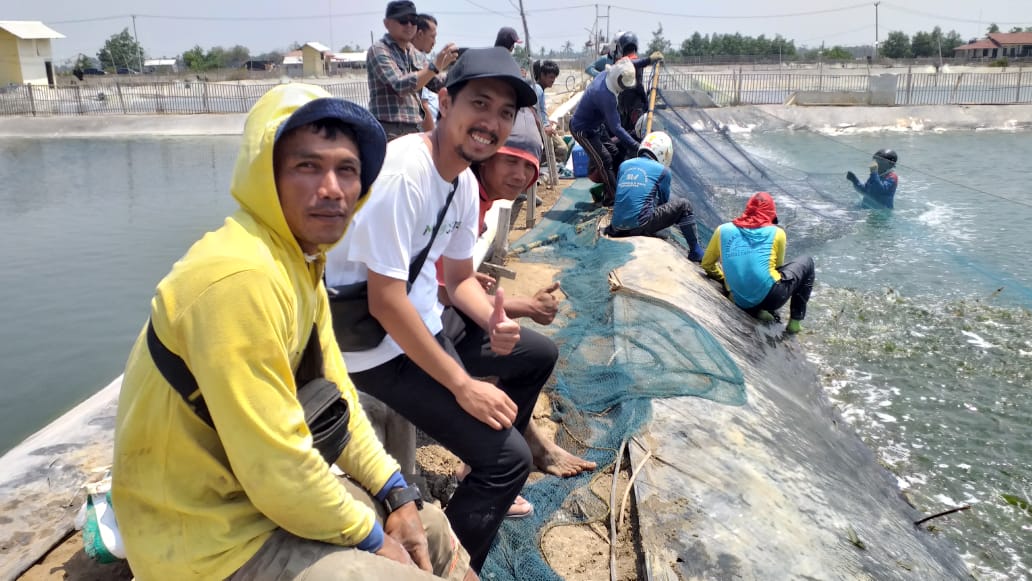
Rizky Maulana (CEO of Mina Ceria) with the Mina Ceria Team
Mina Ceria focuses on fostering fish farming through aquaculture, believing it holds the key to unlocking the full potential of Indonesia's coastal wealth. However, based on Rizky’s observation, incoming fish farming businesses often have limited knowledge and experience, exacerbating the fisheries development gap in Indonesia. As a solution, Mina Ceria aims to become an integrated fish farming management service by providing the construction, operation, and sales of fishery products (i.e. tilapia, white leg shrimp, and seaweed farming) as the core of their daily business activity.
Valuing sustainable fish farming practices, Rizky and his colleagues highlight the importance of fostering strong ties between fish farmers and capital owners. However, Rizky realized this commitment is faced with challenges: fish farmers require updates on information for enhanced performance (i.e., market, disease, technology), while capital owners still have limited understanding on the risks and long-term returns of aquaculture businesses. Responding to these challenges, Rizky seeks to continuously develop collaboration, empowerment, and capacity-building with coastal fish farmers, aligning with SDG 8 on Decent Work and Economic Growth. Through these efforts, Mina Ceria strives to generate quality jobs and bolster the growth of small to medium enterprises in the fisheries sector.
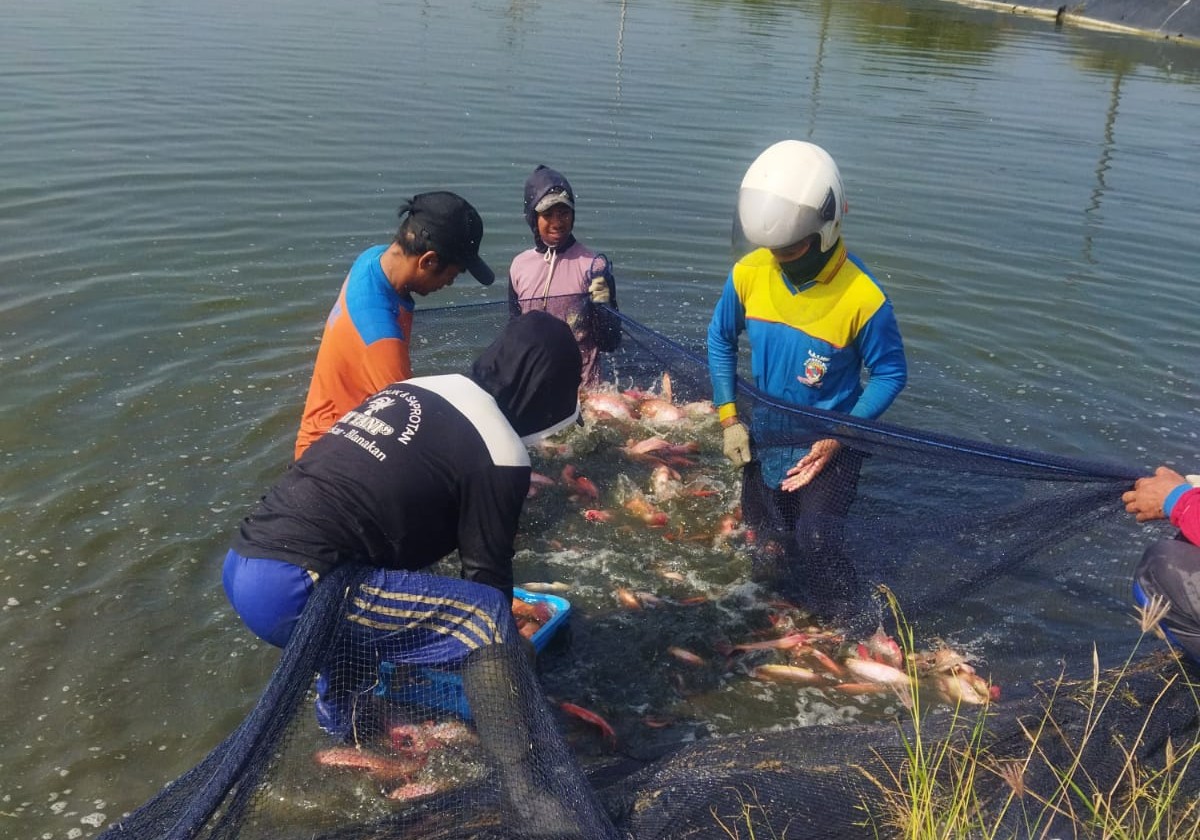
Mina Ceria, Tilapia Harvest
Rizky further emphasizes the importance of including women in fish farming management roles. Indonesia's fish farming industry is commonly male-dominated, limiting livelihood opportunities for women in the industry. He explained that Mina Ceria sets a significant benchmark by ensuring that at least 30% of their team are women. This led Mina Ceria to encourage women to be included in the management team, such as in the operations division, including fisheries technicians – giving them chances to work and contribute to increasing Mina Ceria’s productivity. By upholding inclusivity and promoting equal opportunities in the fishery sector, Mina Ceria aligns with SDG 5 on Gender Equality.
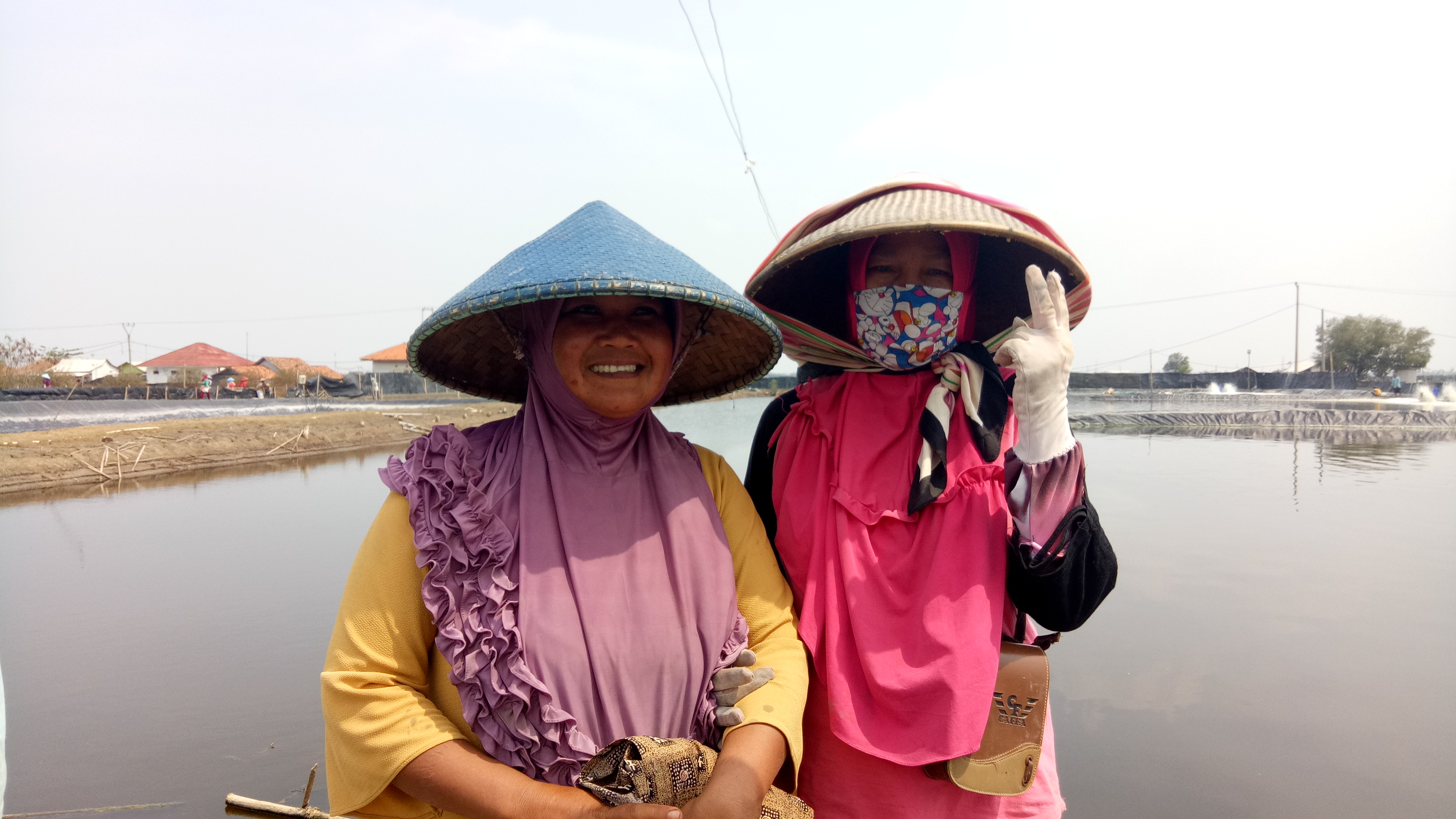
Women in Mina Ceria
Rizky and his colleagues participated in BFA, a six-month intensive accelerator program for blue sector start-ups and SMEs, to better navigate the aquaculture industry and boost Mina Ceria's impact. The program became instrumental for Mina Ceria, recounting that the one-on-one mentoring sessions provided by seasoned industry experts had delivered valuable insights and advice. BFA has helped Mina Ceria’s day-to-day fish farming monitoring and evaluation, favoring the reduction of fish farming waste on marine ecosystems – aiding the achievement of SDG 14, Life Below Water.
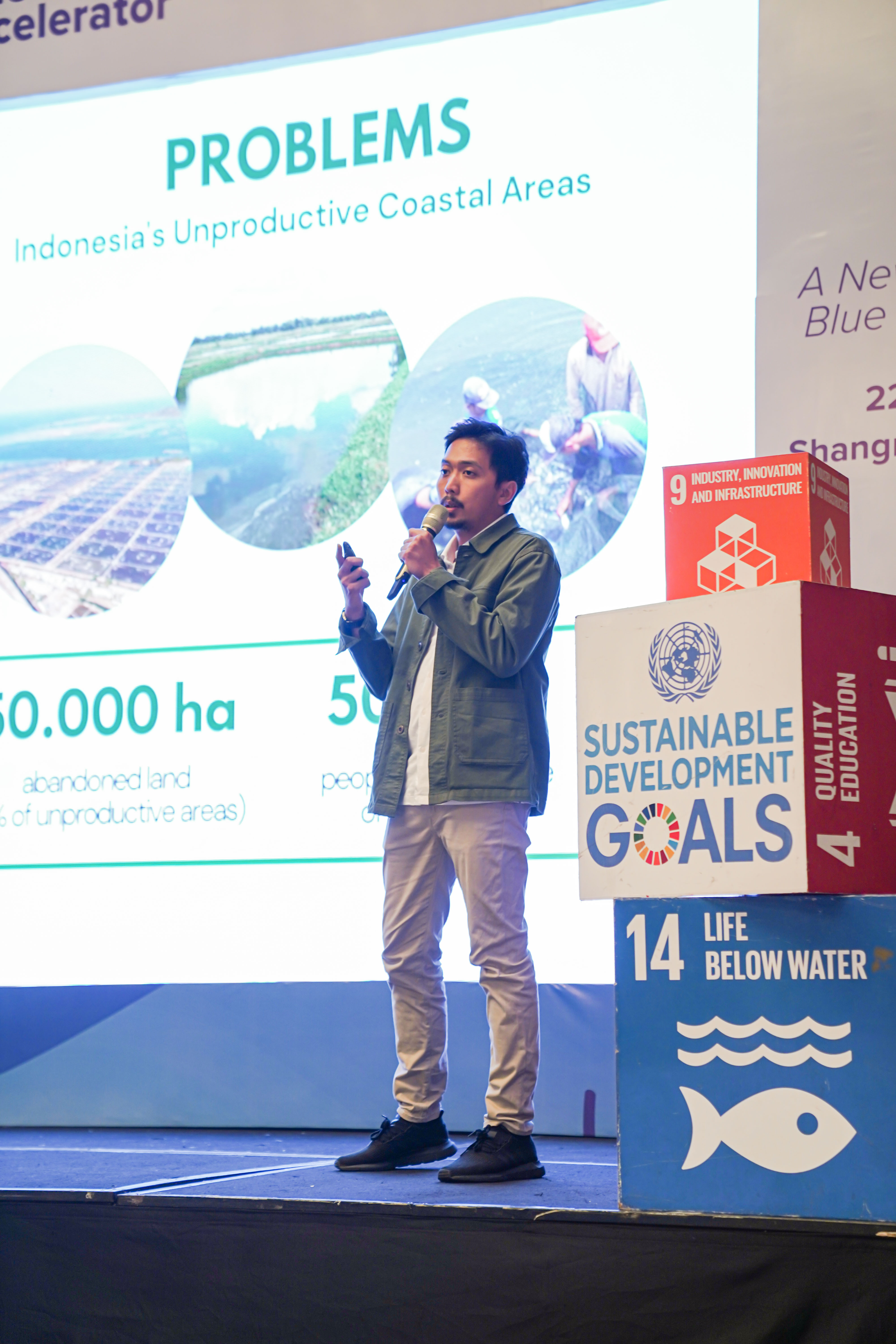
Rizky Maulana presenting in the Blue Finance Accelerator 2023
Rizky praised the BFA program's transformative impact, citing that the workshops have helped him and the team set clearer business goals. He explained, “Back then, we had a general mindset in looking at Mina Ceria’s business. However, BFA made it clearer. For example, we learned that we don’t need to focus on various impact aspects. We focus on one, and then the rest will follow.”
This led Mina Ceria to shift from a broad business approach to a more focused and impactful one, emphasizing specific goals for substantial changes. The team of Mina Ceria learned insights from the Impact Measurement and Management (IMM) sessions, helping them to understand how to create impact and communicate their business and impact performance to investors.
By gathering various startups and SMEs in the blue sector, BFA opened doors for Mina Ceria to connect with potential partners and investors, fostering collaborations. Rizky happily shared that Mina Ceria has collaborated with Sambung Asa, a fellow BFA alumni, in culminating a joint pilot project on fish and seaweed farming in Subang, West Java – further amplifying their impact on the blue economy.
Rizky and the Mina Ceria Team strive to continue advancing Indonesia’s aquaculture development, by utilizing environmentally friendly technology and improving the capacity of local fish farmers.
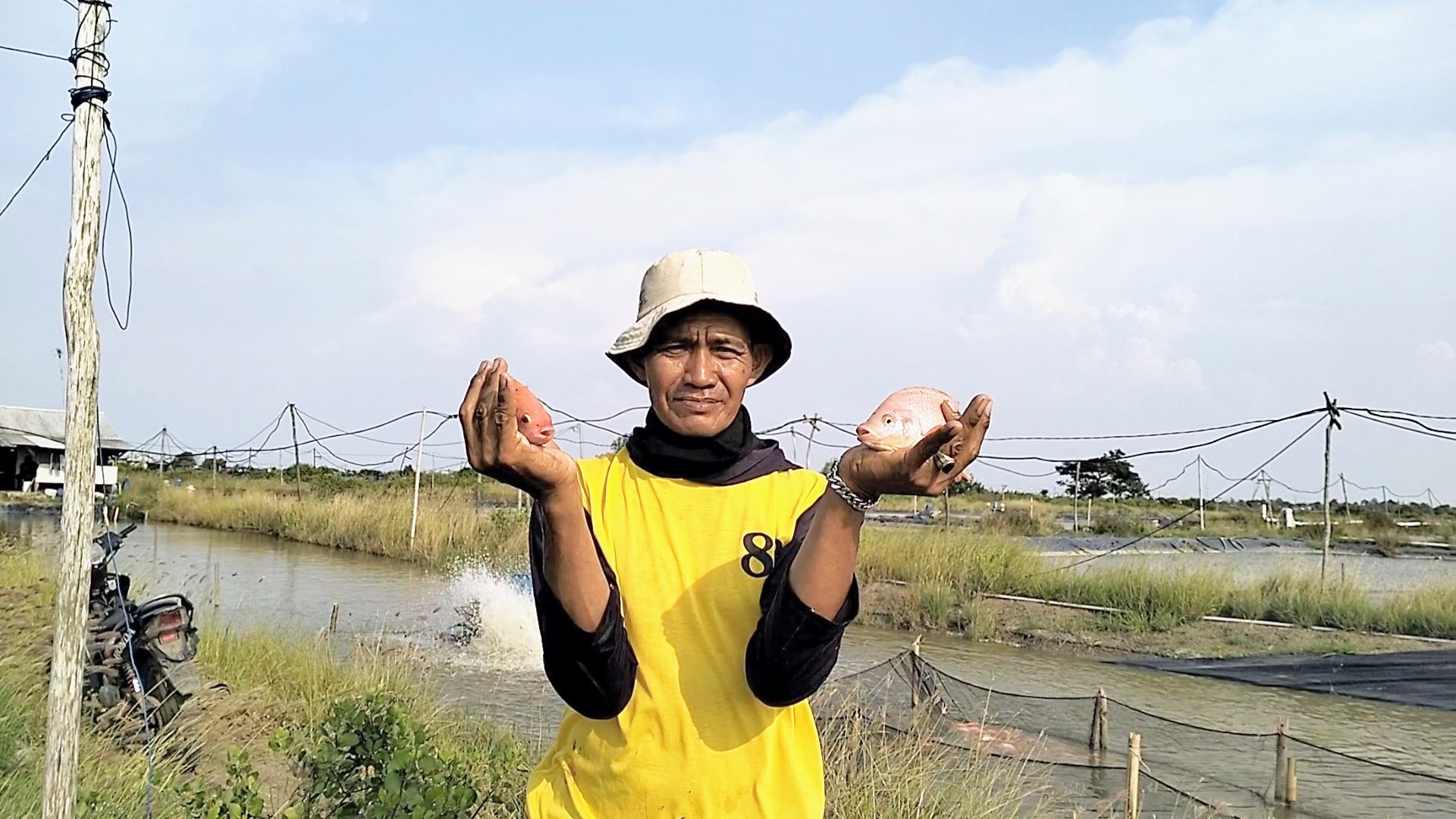
Mina Ceria’s Coastal Fish Farmer Partner
“Towards 2035, Mina Ceria aims to empower 5,000 coastal communities to help them run sustainable fish farming businesses in areas that have been abandoned,” says Rizky.
Through this goal, Mina Ceria hopes their fish farming services can enhance the fish farmers' income above minimum wage, improving their welfare.
Find Rizky and Mina Ceria's latest updates on realizing sustainable fish farming on their Instagram @minaceria.id.
About Blue Finance Accelerator 2023
The blog article is a part of #BlueFinanceAccelerator2023 Human-interest Story series. BFA is a six-month accelerator program that provides capacity development and support mechanisms for business models and impact measurements for startups and SMEs operating in blue sectors. The program was launched by UNDP through the ASSIST JP, supported by the Joint SDG Fund, in cooperation with the Coordinating Ministry for Maritime Affairs and Investment, UNIDO, the Asian Development Bank (ADB), and Instellar as the implementing partner.
Written by Belinda Nur Fadillah & Agnes Milka Kurniawan (Innovative Financing Lab, UNDP Indonesia)
Edited by Enggi Dewanti & Elizabeth Gabriela
Media Engagement: Devi Nugraha & Enggi Dewanti

 Locations
Locations